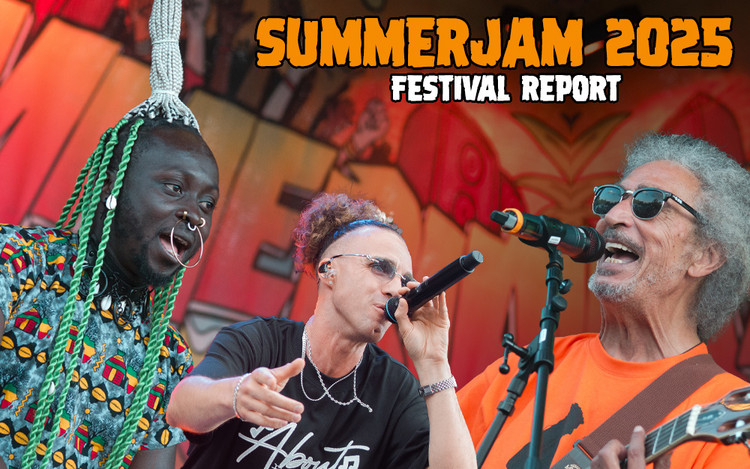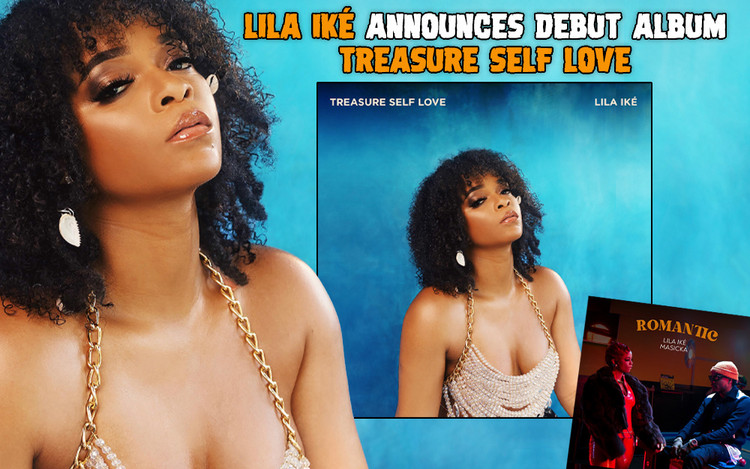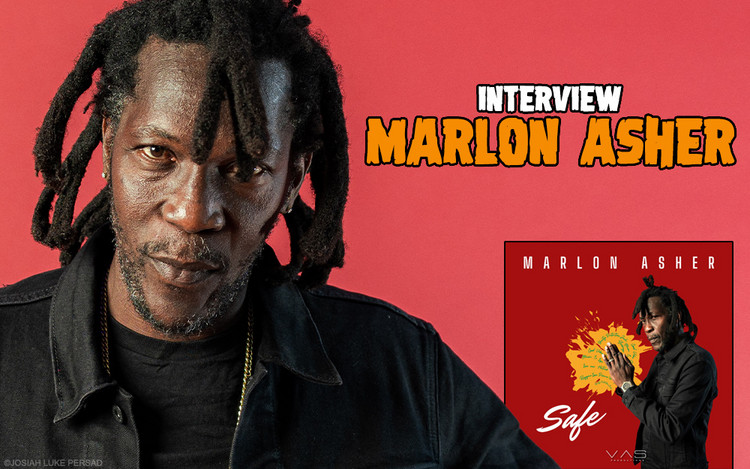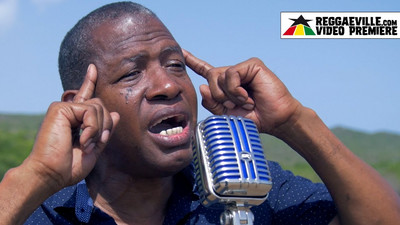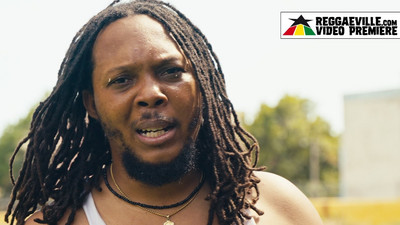Nadine Sutherland ADD
Interview with Nadine Sutherland [Part 1]
04/16/2016 by Angus Taylor
![Interview with Nadine Sutherland [Part 1]](/fileadmin/news/nadine-sutherland-interview2016.jpg)
Reggae singer, dancehall hit-maker, child star-turned-Cultural academic – Nadine Sutherland’s performing arts potential has overflowed in all directions.
She was discovered, aged 11, when she won a 1979 Tastee Patty talent contest and signed to Bob Marley’s Tuff Gong Records. There, she voiced the haunting Starvation on Bob’s 56 Hope Road imprint – sounding socially engaged beyond her years.
In the aftermath of Marley’s passing, she decided to complete her schooling and take up steady work as a backing vocalist with producer Gussie Clarke. Inevitably she cut some sides for Clarke’s Slipe Road neighbour, Donovan Germain. One of these became 1993’s massive duet with Terror Fabulous, Action (a dancehall smash and political campaign song used by the JLP).
Entering the new millennium, she revisited her talent show past as a judge on Digicel Rising Stars, before completing her Masters in Cultural Studies at the University of the West Indies. More recently, she has returned to the roots rock reggae where she started: like the formidable Inna Mi Blood for the UK’s Mad Professor.
Reggaeville meets Nadine in the stately gardens of Kingston’s Devon House (former residence of Jamaica’s first black millionaires and makers of some of the world’s best ice cream). Nadine arrives looking as serene as the locale - with bronzed, braided hair and hazel green eyes. She perches, poised on a stone bench, and we begin to talk.
She seems to inhabit the moment: boisterous when sharing her childhood memories, then switching to the steely voice of academic womanly experience. Her career has had its starts and stops, its ups and downs, but she has done it all on her own terms.
How did you first start singing?
There is not one specific incident I can say where I started singing. I just sang! My recollection of myself, the farthest I can go into myself I was singing. But most of all winding up myself - dancing - but more winding – I was just inclined to wind! (laughs)
So was dancing a potential career for you?
That’s what I wanted to be. I wanted to be a dancer more than a singer. Actually I dreamed of being a dancer. I dreamt of dancing with NDTC – the National Dance Theatre Company of Jamaica. On weekends and on Sundays I would be looking at these dance shows, even some opera because at that time Jamaica was getting its own voice so it was very reliant culturally on European standards. So in my early years in the 70s you still would see the operas on Sundays and you still would see the ballerinas and sometimes they would put in an NDTC. So I used to watch these ballerinas and do the moves. Nowadays I can’t go on my toes but I’m not too bad with some of those ballet moves. I was starting to dance with an African dance group - just intrigued and interested in dancing.
There is a story in my family which we still laugh at when we meet on holidays – they didn’t laugh at it then! My aunty she went to see some go go dancing and she was relaying the story to my family. I didn’t know what go go dancing was but it had dance in so I’m told that they asked me “What you want to do in your life?” and I blurted out to my grandmother and my mother “I want to be a go go dancer!” Obviously just think about how it impacted those women! I feel even now my grandmother is on the other side, I still see her spiritually looking down on me wondering “She turned out ok? She alright? She wanted to be a go go dancer you know?” Oh God, it was like the talk [of the family]. They watched me for all my life!
So how come singing got in the way of your dancing ambitions?
I was also singing. I was this kid that was gifted with singing and dancing. So my parents used to show me off. “Oh, Nadine!” At all the birthday parties. I was a little girl, basic school, that was before primary school – sing sing sing! Even in church, we would go to church and they were like “Nadine can sing!” I was either singing or dancing. I had this natural knack. When I was 11 there was this talent contest and I entered and I won.
This was the Tastee Talent contest?
Yes, and the major prize was being signed to Tuff Gong. Bob was alive at that time. I was signed to Tuff Gong, I went there.
Is it true that you beat Yellowman in the Tastee Talent contest?
I did. I beat Yellowman. I beat Paul Blake. I beat a lot of people. I kicked ass man! (laughs)
What was the song you sang?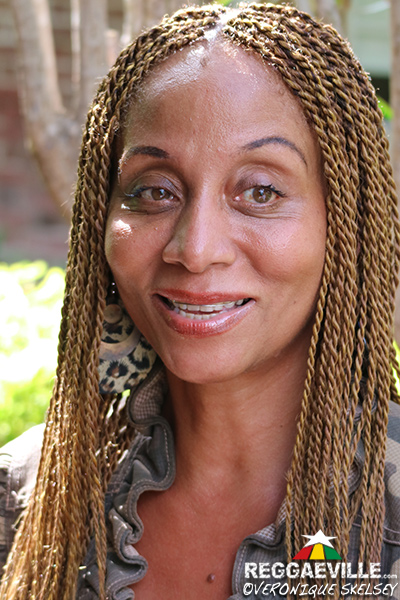 You had four quarterly concerts. My father, he wasn’t a Rastafari then but he was Rastafari inclined. I grew up in the roots of the people listening to the Dennis Brown and Bob Marley. I was fed on that diet. And also to the Arethas. My mother liked the R&B and my father liked the roots. So I grew up with a fusion of that.
You had four quarterly concerts. My father, he wasn’t a Rastafari then but he was Rastafari inclined. I grew up in the roots of the people listening to the Dennis Brown and Bob Marley. I was fed on that diet. And also to the Arethas. My mother liked the R&B and my father liked the roots. So I grew up with a fusion of that.
The song that I sang at the quarterly was (sings) “Africa we want fi go”. The finals? It was (sings) “Light up your spliff… Light up your chalice… Come mek we bun it inna Buckingham Palace”. Peter Tosh. Honey child, I don’t know what I was singing. I remember vividly that I loved the song. I asked my father to buy the album because my mother and my father were extremely supportive. To perform my mother got me a little pretty dress! (laughs) I wanted to sing that song. They never questioned it. As my father was a rootsman he never questioned the impact but the song at my age that I went to sing – when I’m looking back at it I’m like daaaaayyyyyummm! And I was dancing! I was an 11 year old child who had never smoked weed. When I look back I was like “Jesus help me, save me!”
That Gaylads song you sang… have you ever…
I thought it was Dennis Brown?
Originally it was sung by the Gaylads in 1967 and the melody was based on a track by Cyril Diaz Orchestra from Cuba…
Why do I meet you now? I just finished my Masters at the University of the West Indies. I needed you when I was doing my research! (laughs) It was in by December 5th. You could have given me all of these pointers.
I was going to ask, have you ever considered re-singing that song?
Never. If you Google me you’ll see this little Marga skinny girl – I looked like Kermit the Frog singing Africa We Want To Go.
When you next see Neil Fraser the Mad Professor, could you tell him I asked if you could sing that song together? There was a great cut at Channel One by Stephanie Samuels and I think the time is ripe for you both to it again.
(laughs) Don’t worry I will. If it’s anything like Inna Mi Blood with those drums man, it should be the bomb!
Sorry, let’s get back to being signed to Tuff Gong.
I don’t remember the specific date of the talent contest but a couple of days after we went to Tuff Gong. And when I went to Tuff Gong, there was Mr Marley! I’ll never forget that day. It was so indelible in my mind. I remember Diane Jobson, Bob’s attorney, with her big natty and her big car! She took me around and said “Bob! See the lickle girl here!” And there was Bob smiling down at me! I’ll never forget that. Bob was beaming to meet me when I was introduced to him.
I have to admit I never understood how profound that moment was. I was a kid so I was more interested that I’d just passed Common Entrance to go into High School and was more absorbed by being accepted. I really was just a little child. I looked like seven. I was one of those whingey whiney little girls – I looked so tiny. And there was Bob. Then after that they orchestrated and got a songwriter for me. I had to go to Tuff Gong almost every single weekend and they taught me my little song (sings) “Starvation on the land!” which you can get on YouTube.
I’m proud to own it on 56 Hope Road 45.
There you go! So I would practise until there was the big day! My first studio gig ever! I was so excited but I think my father was more excited. Every time I speak that story I still get emotional because it’s so far [back] but it’s such a beautiful story. There I was, totally excited, the first thing with professional musicians. I didn’t know they were professional musicians. I was just a little girl and everybody was excited.
They called me, they put me there and there was this microphone and I was like (sings) “Ooh yeah yeah yeah” and who burst in? It was Bob who burst in and he was like (kisses teeth) “What you doing? Put ‘pon the stool man” I couldn’t even reach the mic! So they put me on the stool which gave me a little more length. “Mek her siddung”. They had these stool that were kind of high. They were made for adults.
They placed me on the stool and I was like (sings) “Starvation on the land” and Bob said “Alright” and then he went around the console. I had no clue what was happening. (move up) He came in and was like “Yeah man”. I know I have the mindspace and the musicians went (sings bass line) “doom-doogoo-doogoo-doogoo-doom” and Bob saw that and he went (sings rhythm guitar) “check-eh check-eh” and he was telling the musicians. If you listen to Starvation you hear a Wailers feel because Bob was directing the music. (big sigh) Oh God! It was just such an incredible story.
Throughout your life you have never neglected your education while pursuing music. Was that something your parents instilled in you?
Totally instilled. Actually academic-wise I was not… I was kind of bright. It wasn’t really encouraged in terms of how some people always say… you grow up with a narrative that you are artistic. So I did ok in high school. I did better at the university because I totally took that narrative out of my head.
My family is a big family and there are many voices. My father was accountable to his sisters and there was a group of people who insisted “give her the basic education”. Because at that time my high school that I went to, St Andrew High School, is a very prominent high school in Jamaica. It’s an all-girls school and it still is one of the top - so to get into that high school alone was an achievement. So I had to go through. My father was insistent that I get my High School education.
What did your mother and father do for a living?
He was a taxi man. We weren’t rich people but I don’t know about sufferation. I can’t speak about that because my father was a very productive man. He bought his land in Above Rocks. He had his own house. He was a very constructive thinker in terms of his future. He bought his house when he was 33. He was not a rich man but he really was grown from the usual Jamaican rural kind of mentality where you have to try to make your life and work! We poor but we full of dignity! That was the kind of mind-set that my family was grown on. I guess in some sense I kind of have that foundation because I love to work! (laughs)
My mother… I am what we call a Barrel Child. She left when I was 12 to go to the States. We still communicated, the family was still there but it was kind of broken because she was away. But she still spoke into my life. Everybody eventually lived back together but I’m the typical Jamaican, not rich person story. My father wasn’t like a lawyer or doctor and my mother wasn’t like the struggling people. As I said, I don’t know poverty. I can’t really speak about hungry belly because that was not my reality but I was not living in posh-ness or prosperity. I was provided for but I knew the value. People who were trying to make their lives. People who were just trying to move their lives from one level to another. That was their story.
Where does the music come from in your family in terms of lineage?
Two sides. My mother back in the days, you have to understand the age group and now studying culture I understand why my mother would [sing] (imitates opera singing) that European kind of singing. She was great, my mother. She doesn’t practise but I remember my mother singing with this kind of voice. My mother was also very artistic. She could draw and she was a good artist.
My father was a good singer. He said to me that during the Wailers time he went to audition with this group as a harmony singer although I don’t remember the name of the group. So both of them had incredible voices. The singing was not one side. I got it double dosage.
So when you joined Tuff Gong you said Starvation On The Land was written for you?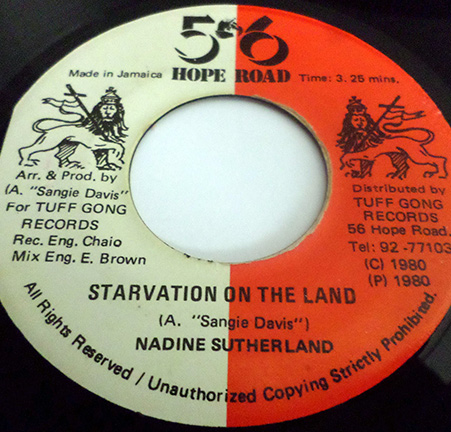 Written for me by Sangie Davis. It was Sangie’s song. At the time Starvation was written there was a new social phenomenon that was happening in Jamaica. We had all these young men cleaning car windows at the stop light – you see them all the time now but at that time it was new. It was really “Lord, look where we a come to!”
Written for me by Sangie Davis. It was Sangie’s song. At the time Starvation was written there was a new social phenomenon that was happening in Jamaica. We had all these young men cleaning car windows at the stop light – you see them all the time now but at that time it was new. It was really “Lord, look where we a come to!”
What impact did those lyrics make on you at age 11?
I swear to God, I’m not going to tell you any wonderful hifalutin story. I was 11. I sang it and I danced it but I was not able to process it. I was not a conscious sister at 11. I was a kid who could sing and dance and get this material and deliver it.
And at the same time you were absorbed in high school.
I started high school. I love this little story. St Andrew High School was everybody from every social echelon. It had more of an upper middle class, upper class thing there. I was probably one of the poorer students.
I remember standing in a class and going “My name is Nadine and I am an amateur singer” and everybody chuckled. By the time Tastee came and Tuff Gong I was like “Seeeeee you allllllll! Look at me!” (laughs) I was like “Amateur singer? No amateur singer! PRO-fessional!” But they were just being girls. My school is extremely supportive of me. The women I went to school and even the women beneath us and before us – it is a great institution to stand on the shoulders of.
Who played on Starvation?
Steelie and Clevie played on it. Clevie played the drums, Generation Gap the bass player for 12 Tribes [Junior Dan?] played the bass. I know Ras Brass – Dean Fraser, Nambo and Chico did the horns. I don’t know about the guitar.
Did Sangie play the guitar?
I’m not too sure. But those people I remember vividly. Because I thought it was Steely and Clevie’s first song but Clevie told me “No, it wasn’t our first song!”
What were your memories of what Bob was like to work with? How much did he interact with you after that first meeting?
Well you have to remember I was a little child. Bob was extremely considerate. Just a beautiful spirit. He transitioned after a year and most of the year I spent with him he was on tour. But every time I had to go up and see him he asked me how I was doing. I heard he was busy overseeing my career. I know he was going to sign to Polygram. I know he spoke about me a lot to the adults who would come back and tell me they saw him mention me in interviews.
But another profound moment that I’ve held on to apart from Diane taking me up and “Bob is here!” and him saying “What you doing Nadine? How is school?” and whatever, was myself, Cedella, was it Ziggy and was it Stephen? He had a farm up in Above Rocks and I went up there. We were coming by and the driver, Allan, collided into this man and he threw the man in the back of the van. Oh my God, we were so traumatised. And I think he just went to Tuff Gong instead of going to the hospital.
Bob was enraged. He was enraged because he saw we were traumatised. He was like “An you have the children in here?” and he cussed off and cussed off. I remember we were shell-shocked. Me and his kids were there. I guess he transported the man to the hospital. I don’t know what happened. I was a child. But I guess they dealt with it. And Bob was like “Nadine, come, come”. He became my father at that point – to all of us – and he was like “Nadine, you alright? You ok?” (pauses) I still get emotional, speaking about Bob. And then the fudge man stopped and bought us all ice-cream. That was just not something for children to see. I remember that moment with Bob, trying to just be a father to me and his other kids.
In the Marley movie Ziggy said that his father could be quite stern and push his kids quite hard. Was he softer on you?
He was softer, but look at that them now? Usually your own parents push you harder than they would push another kid. And when I look at it, he has created some champion children in terms of how you see his kids and the unit they are in terms of protecting his legacy. I say to everybody “They didn’t sit on Bob Marley money.” They could be some lazy ass bums! “Yeah, let’s enjoy ourselves. We got a million or whatever!” But they try to ensure that it makes money and they go and do their stuff in the world so I have a lot of respect and admiration for them.
You performed at several of his memorials.
I didn’t perform at the big national one. There was one in Nine Mile. It was a beautiful tribute. I never forgot that Nine Mile show. Red, gold and green. There was a memorial a year after in Florida and I performed there. I think I probably sang Starvation. I’m not quite sure what I sang because it was so long ago but I remember I was at that memorial. There were several memorials. I think the first Sunsplash after Bob transitioned was a tribute to him and I performed on the Tuff Gong stage.
Obviously, you must have felt the loss personally. Did you feel there being a greater loss for the world?
You could not help but feel the loss of Bob Marley. I remember going to Tuff Gong. Oh. My. God. People were crippled. Actually, looking back, it was almost like the walls cried. For several years you’d walk into Tuff Gong and the walls were mourning. So you must understand it transcended human… the place actually felt like it was mourning… the whole physical structure. It took years for some people to get their bearings back together. Some of the people at Tuff Gong… it took years for some of them to rebound. The power that was Bob Marley. The power that was that man.
Now, I have studied him from an academic perspective but living it and my recollection of those moments… sometimes you think it’s a myth about somebody having a spirit. You hear about big spirits in the world and you’re like “Oh, God, people created that”. But my belief, living through some of the stuff is that he was definitely a gift who needed to sing things musically so that message could be disseminated to the world so people could enjoy themselves and at the same time listen to it.
I’m glad that the Divine works in mysterious ways, although there is a machinery that some people can call Babylon, and sometimes Babylon was necessary to get that message across. It couldn’t be that he is in the mountains and nobody could hear him because it would not have been something that could have impacted the world.
So everything worked in Divine order. You might say “Oh, Babylon machinery!” Babylon machinery is needed. Babylon machinery is needed for the books that I’m reading right now that speak and take people on a different level where spirituality is concerned. Babylon can be used for good. That’s how I answer some of these people and their thing about Babylon and Bob.
Is it true that you also toured with Bunny Wailer?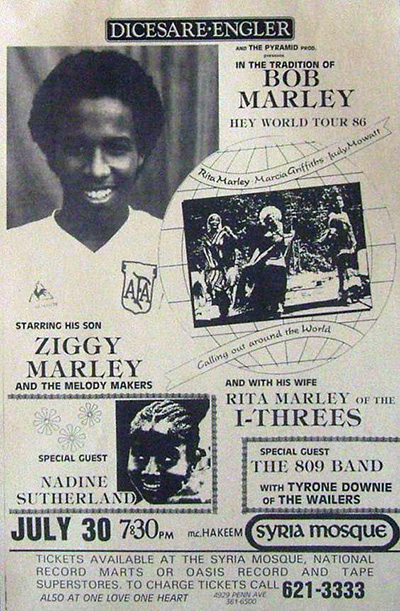 I did not. I don’t know how to correct it. It’s so pervasive. I think it’s on Wikipedia?
I did not. I don’t know how to correct it. It’s so pervasive. I think it’s on Wikipedia?
It’s in a book called The Virgin Encyclopaedia of Reggae by Colin Larkin, which people steal from and use the passages for artist entries on Wikipedia.
Oh so they put it on Wikipedia? I did one show with Bunny. I was too young to tour when I met Bunny. I was 11-12 when I had a show and he had his Dance Rock [1987]. He did this big incredible show. A big production with dancers and I was the young star at that point and I did a show. I could not tour. I was too young. My first tour was when I was 18. Come on people!
Tell me about your first tour.
World tour with the Melody Makers – summer time. When I was a big woman and they were basically not young chickadees you know? We were old enough to go on the road. You have to give it to Mrs Marley – she was not only protective of her children, she was protective of me. I think Stephen was the youngest at that time. But we were all teenagers and young adults. You couldn’t take kids out like that.
It wasn’t like the Jacksons then?
Where they were just 12 and 13 and shoved them out there? We performed in Jamaica but they made sure we went through high school and had a relatively normal childhood. Can you imagine if we were going on the road when we were little kids? I’d be psycho!




